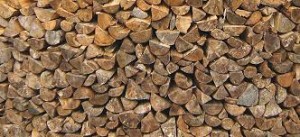
One of the five basic human needs is energy. We use energy to cook, to keep us warm and, in the modern world, to keep our food cold and provide entertainment. In a grid down situation some of the dependencies on this need might be scaled back or removed completely. With some forethought you can provide warmth, hot food and a maybe even a running TV and DVD player to help occupy some time.
All of these needs require fuel in one form or another. Here is a breakdown of some (I know I am missing some) types of fuel, broken up by what need they can help meet. As I am writing this I am thinking of an event such as an ice storm that has brought down the overhead power lines and my entire town is without electricity. The power company will be able to fix it, but it could take as long as a week.
Cooking
Wood, Charcoal, Propane and Natural Gas
Heating
Wood, Charcoal, Propane, Natural Gas and Kerosene
Emergency Power
Diesel, Gasoline, Propane and Natural Gas
Wood
Wood can take 6-12 months to “season” or dry out before it is best for burning. You must have a wood burning stove or fireplace to utilize it indoors. If you have an indoor fireplace, please have it inspected and don’t just keep it as the “I’ll use it if I have to” plan. It takes a lot of work to get wood to the usable size sold in local stores. Unless you have the tools and know-how, going out to get wood “if it hits the fan”, isn’t a great fall back plan. You can buy wood now and pile it, let it season until needed, but then you still need to have an indoor method to use it.
Charcoal
In my opinion charcoal is great for grilling. Having a bag or two stored might not be a bad idea. However, in my opinion, it’s not great for a grid down situation. It is for outdoor use only. You can cook with it outside but that’s about it. I don’t have much experience with storing charcoal for long periods but I have had trouble starting some that was left in the bag from the last season.
Kerosene
In truth my knowledge of kerosene is limited. What I know is from the little research I have done. I believe you can buy kerosene at Home Depot or similar stores. Other than that I can only think of one place I could buy it in bulk quantities. I have read that it can store for a very long time in a metal drum but in plastic containers, only for months. I think that has to do with the plastic leeching, but that is only a guess. The heaters that I have looked at are expensive and most say they are rated for outdoor and indoor use, with proper ventilation.
Diesel and Gasoline
Diesel stores better then gas does but neither store indefinitely, even with additives. You could use a rotation system similar to having four, five gallon containers full in the garage. Each week before you go to the gas station to fill up, you pour one of the 5 gallon containers into your vehicle. You would then take that container and put it in the back of the rotation. This way you always have 20 gallons of fuel and it should all last the month it will be in the garage. These two would primarily be used for a generator or extra fuel for the vehicles.
Natural Gas and Propane
Natural gas and propane have a lot in common. Many homes use them as their primary fuel now. Here is an article that explains some of differences between propane and natural gas. One important thing to be aware of is that both gases store indefinitely, without any additional additives.
My home uses natural gas; for the furnace, water heater, stove and dryer. If you’re in the same boat, as long as the gas company has power, we’ll have natural gas. In the ice storm scenario with no electricity, I am faced with some of the appliances having an electric start, such as the stove. I would have to carefully use a lighter on the burner to get flame. The blower in the furnace is electric as is the ignitor, so a means of powering the fan, lighting the ignitor or an alternate way of heating would still be required.
From my research on the two, natural gas is most commonly used to fuel households and some vehicles. Because propane is more easily available in smaller tanks, it is used for both of those as well and small heaters, generators, camp stoves and camp lights. It is also much more readily available. I can think of one place to get natural gas and multiple convenience stores as well as two businesses that sell propane, all within a 5 minute drive.
A warning about using the propane quick exchange machines at convenience stores, often they will only fill a 20lb tank to 15 lbs. My guess is they think they could over fill it and explode. Using those machines would be a good idea if you have a beat up tank and you wanted to exchange it. (A commenter later pointed out that it was federal law that prohibits exceeding 15lbs)
Because of the storage life, the variety of things it can be used for and the availability of it, propane is the fuel I have decided to store.
Please click here to vote for Prepared Christian as a top Prepper site!
If you liked this article please think about sharing it on the social media listed below, thanks!



